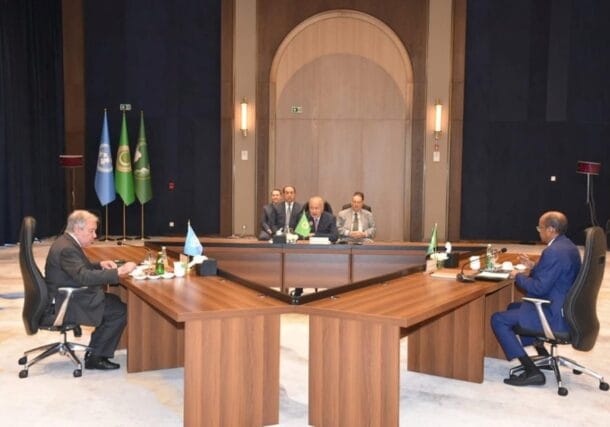In a significant show of international unity, the African Union, United Nations, and Arab League have pledged to coordinate their efforts to bring an end to the ongoing conflict in Sudan, while firmly rejecting any moves to establish a parallel government in the country.
During a high-level consultative meeting on the sidelines of the Arab League Summit in Baghdad on May 16, the heads of the three organizations issued a joint statement calling for an immediate and permanent ceasefire, unimpeded humanitarian access, and the preservation of Sudan’s sovereignty, unity, and territorial integrity.
The leaders agreed to strengthen coordination based on comparative advantages and mutual trust to address longstanding challenges that have hampered past mediation efforts. They also proposed forming a broader multilateral caucus to support political dialogue and pledged to review progress during upcoming international summits, including the UN General Assembly.
The following day, the Arab League reiterated its stance during the conclusion of the 34th Arab Summit, stating unequivocally that any attempt to form a parallel government in Sudan is illegitimate and threatens the country’s stability. Ambassador Jamal Rushdi, spokesperson for the Arab League Secretary-General, said the summit reached a unified Arab consensus supporting Sudan’s official institutions and calling for a political resolution to the crisis.
Sudan’s representative at the summit, Sovereign Council member General Ibrahim Jaber, presented his government’s roadmap for peace, which includes a ceasefire, withdrawal of Rapid Support Forces (RSF) from occupied territories, the lifting of the siege on El Fasher, and the return of displaced populations.
The summit communiqué emphasized the importance of inclusive dialogue, welcomed the Intergovernmental Authority on Development’s (IGAD) initiative to unify peace platforms, and urged conflicting parties to re-engage in talks such as the Saudi-U.S.-led Jeddah process.
Egyptian President Abdel Fattah el-Sisi underscored the urgency of the situation, warning that Sudan stood at a “dangerous crossroads” that could threaten its very existence. He echoed the call to preserve Sudan’s national institutions and oppose any bid to form alternative administrations.
The latest developments mark a renewed push by regional and global actors to resolve Sudan’s devastating war, which has displaced millions and triggered a growing humanitarian catastrophe.



